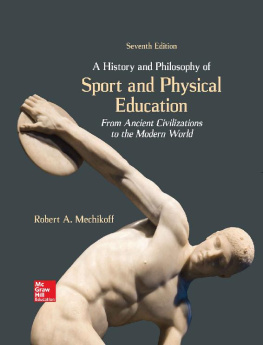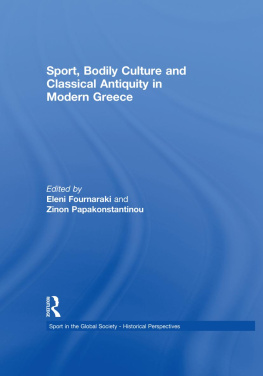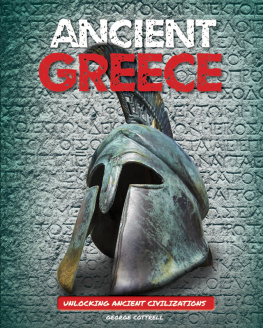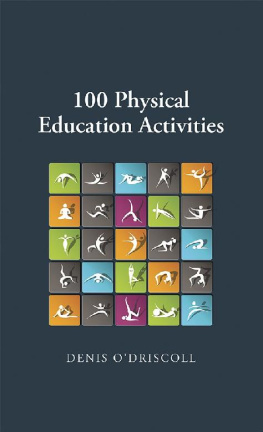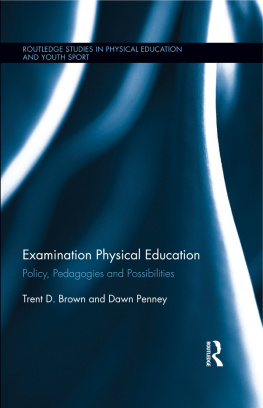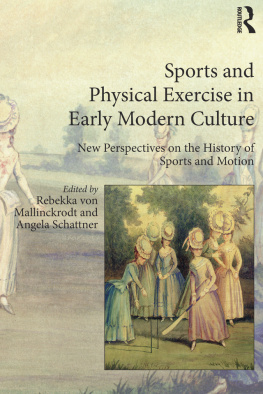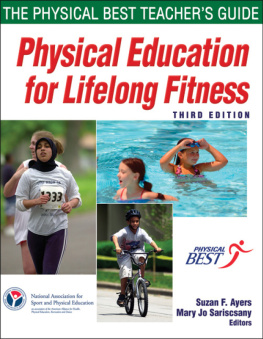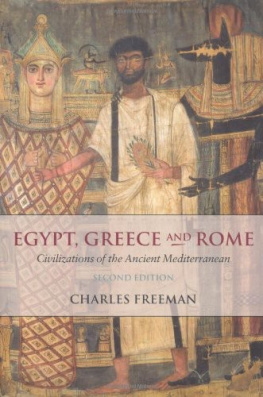Seventh Edition
A HISTORY AND PHILOSOPHY OF SPORT AND PHYSICAL EDUCATION
From Ancient Civilizations to the Modern World
Robert A. Mechikoff
Concordia University Chicago

i

A HISTORY AND PHILOSOPHY OF SPORT AND PHYSICAL EDUCATION: FROM ANCIENT CIVILIZATIONS TO THE MODERN WORLD, SEVENTH EDITION
Published by McGraw-Hill Education, 2 Penn Plaza, New York, NY 10121. Copyright 2020 by McGraw-Hill Education. All rights reserved. Printed in the United States of America. Previous editions 2014, 2010, and 2006. No part of this publication may be reproduced or distributed in any form or by any means, or stored in a database or retrieval system, without the prior written consent of McGraw-Hill Education, including, but not limited to, in any network or other electronic storage or transmission, or broadcast for distance learning.
Some ancillaries, including electronic and print components, may not be available to customers outside the United States.
This book is printed on acid-free paper.
1 2 3 4 5 6 7 8 9 LCR 21 20 19
ISBN 978-1-259-92243-5 (bound edition)
MHID 1-259-92243-X (bound edition)
ISBN 978-1-260-39189-3 (loose-leaf edition)
MHID 1-260-39189-2 (loose-leaf edition)
Product Developer: Erika Lo
Marketing Manager: Meredith Leo
Content Project Managers: Lisa Bruflodt, Emily Windelborn
Buyer: Laura Fuller
Designer: Debra Kubiak
Content Licensing Specialist: Jacob Sullivan
Cover Image: Lev Tsimbler/Alamy Stock Photo
Compositor: Lumina Datamatics, Inc.
All credits appearing on page or at the end of the book are considered to be an extension of the copyright page.
Library of Congress Cataloging-in-Publication Data
Names: Mechikoff, Robert A., 1949
Title: A history and philosophy of sport and physical education : from ancient civilizations to the modern world / Robert A. Mechikoff, Concordia University Chicago.
Description: Seventh Edition. | New York : McGraw-Hill Education, [2019]
Identifiers: LCCN 2018049385| ISBN 9781259922435 (acid-free paper) | ISBN 125992243X (acid-free paper)
Subjects: LCSH: Physical education and trainingHistory. | SportsHistory. | Physical education and trainingPhilosophy. | SportsPhilosophy.
Classification: LCC GV211 .M43 2019 | DDC 796.09dc23
LC record available at https://lccn.loc.gov/2018049385
The Internet addresses listed in the text were accurate at the time of publication. The inclusion of a website does not indicate an endorsement by the authors or McGraw-Hill Education, and McGraw-Hill Education does not guarantee the accuracy of the information presented at these sites.
mheducation.com/highered
ii
CONTENTS

iii
iv
v
vi
vii
viii
ix
x
PREFACE
T he seventh edition is revised and written with the intent of providing a more user-friendly approach. Over the years, some of my colleagues and students commented that the philosophical content could be difficult to understand. With this in mind, philosophical content in some chapters that may have been cumbersome has been rewritten. The intent is to provide better explanations and examples that enable students to understand the philosophical beliefs that have had a major impact upon sport and physical activity over the centuries.
The impact of the philosophical and theological beliefs relative to how the human body is valued, or not valuedand by extension, how sport, exercise, and physical education have been celebratedor condemned continues to be a dominant theme in the seventh edition as it has been in previous editions. Explained in another way, the history of sport and physical education has been significantly influenced by religious and philosophical beliefs. Some of the previous material specific to the philosophical and theological positions of the body and how these beliefs and practices impacted sport and physical education have been removed, while some new material and relevant examples have been added. Again, the focus is making the seventh edition more user friendly and understandable.
SELECTED HIGHLIGHTS
Social, political, and technological changes have exerted a profound impact on sport over the centuries, and this theme remains an important aspect in the seventh edition. Most of the chapters have been modified and some have been rewritten to provide a better explanation and mental image of what is taking place. In some cases, chapters were incrementally expanded when it made sense to do so; for example, Philosophy, Sport, and Physical Education During Middle Ageshas been expanded to include coverage about the purpose of sport in the Medieval period as well as new information about several famous athletic knights who achieved fame and fortune as tournament professionals. As it turns out, some of these Medieval knights traveled with an entourage and would make an impressive entrance to the event and, in due course, make bold proclamations, very similar to the behavior of some of the athletes competing in the twenty-first century. Some things never seem to change.
New maps of the ancient world along with new images have been added. Older maps and images have been deleted. is to provide an introduction to the utility or practical application of both history and philosophy.
xi
History, although taking place in the past, is relevant and illuminating. There continue to be events and situations that, while taking place today, appear to have their genesis or beginnings in events and situations that previously took place. History tends to be repetitive, and to paraphrase the eminent Spanish philosopher and historian George Santayana (18631952), Those who do not remember history are condemned to repeat it. Examples of how students can utilize history to foresee and possibly predict how current situations and practices will eventually turn out are provided so; they can historically evaluate these new ideas and approaches and determine if these have been tried previously and failedor succeededbut only if they know how to appreciate and use history. This is discussed in , some of the philosophical schools that have or can impact sport, physical education, and kinesiology are presented.
The Greek philosopher Socrates said that the unexamined life is not worth living. Kinesiology and sport should heed the advice of Socrates and determine if the path we are on is the correct one or not. New information on deontology and teleology provides students with actual models of ethical decision making that can be readily applied to athletic competition, coaching, and personal behavior.
The section on the modern Olympic Games now includes the 2014 Sochi Winter Olympics, 2016 Rio Summer Olympics, and the 2018 PyeongChang Winter Olympics. This section ends with new coverage of the Special Olympics and the Paralympics.
Suggested Readings have been updated. Internet Resources have been updated and dramatically expanded. There are numerous links to journal articles, personal accounts of sporting events, and perhaps most noteworthy, numerous Internet links to videos that should help both students and instructors actually see some of the events, individuals, and teams/groups that are discussed in each chapter.
Next page
